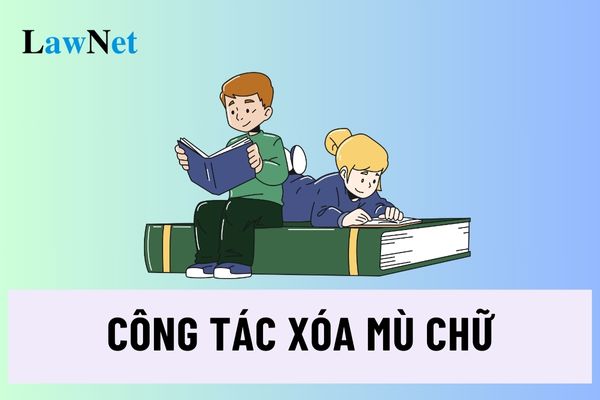Vietnam: What are the two levels of recognition for district-level standardized illiteracy eradication?
What are the two levels of recognition for district-level standardized illiteracy eradication in Vietnam?
According to Article 20 of Decree 20/2014/ND-CP, the regulations are as follows:
Criteria for individuals to be recognized as standardized illiteracy eradication at level 1
1. For communes: At least 90% of people from 15 to 35 years old are recognized as standardized literates at level 1 and at least 90% for communes with extremely difficult social-ecomic conditions with people from 15 to 25 years old to be recognized as standardized literates at level 1.
2. For districts: At least 90% of communes are recognized as standardized illiteracy eradication at level 1.
3. For provinces: At least 90% of districts are recognized as standardized illiteracy eradication at level 1.
According to Article 21 of Decree 20/2014/ND-CP, the regulations are as follows:
Criteria for individuals to be recognized as standardized illiteracy eradication at level 2
1. For communes: At least 90% of people from 15 to 60 years old are recognized as standardized literates at level 2 and at least 90% for communes with extremely difficult social-ecomic conditions with people from 15 to 35 years old to be recognized as standardized literates at level 2.
2. For districts: At least 90% of communes are recognized as standardized illiteracy eradication at level 2;
3. For provinces: There must be 100% of districts recognized as standardized illiteracy eradication at level 2.
Thus, the two levels of recognition for district-level standardized illiteracy eradication in Vietnam include:
Level 1: At least 90% of communes are recognized as standardized illiteracy eradication at level 1.
Level 2: At least 90% of communes are recognized as standardized illiteracy eradication at level 2.
Who will compile the illiteracy eradication results to report to the Prime Minister of Vietnam?
According to Article 32 of Decree 20/2014/ND-CP, the regulations are as follows:
Responsibility of the Ministry of Education and Training
1. Develops and requests the organs having their authority to issue or issue under its authority the policies and regulations of law on implementation of educational universalization or illiteracy eradication.
2. Provides instructions for localities on developing and planning school network for the need of educational universalization or illiteracy eradication.
3. Issues and provides instructions on implementing the teaching programs and materials for educational universalization or illiteracy eradication.
4. Provides instructions for localities to implement regulations on profession, training and benefits for persons participating in educational universalization or illiteracy eradication.
5. Takes charge and coordinate with the Ministry of Finance to develop the benefits and policies towards educational universalization or illiteracy eradication.
6. Organizes the examination and inspection of implementation of educational universalization or illiteracy eradication and inspects and recognize the standard achievement of educational universalization or illiteracy eradication towards provinces.
7. Make annual summary of result of educational universalization or illiteracy eradication for report to the Prime Minister.
The Vietnam Ministry of Education and Training is responsible for compiling the illiteracy eradication results and reporting to the Prime Minister of Vietnam annually.

What are the two levels of recognition for district-level standardized illiteracy eradication in Vietnam (Image from the Internet)
What are the expenditures and expenditure levels for benefits and policies related to illiteracy eradication in Vietnam?
According to the regulations in Clause 6, Article 5 of Circular 17/2022/TT-BTC, the expenditures and expenditure levels for benefits and policies related to illiteracy eradication are as follows:
- Expenditures on surveys and investigations serving illiteracy eradication shall comply with the provisions of Circular 109/2016/TT-BTC;
- For learners in literacy classes supported with school supplies by the state:
Depending on the actual situation of the locality, the provincial People's Committee approves the list of school supplies, the number of supported school supplies within the scope of the list of school supplies support for lower secondary schools as specified in Clause 6 Article 2 of Joint Circular 109/2009/TTLT-BTC-BGDDT, jointly issued by the Ministry of Finance and the Ministry of Education and Training, guiding some financial policies for students of ethnic boarding schools and ethnic preparatory universities;
- The state budget funds expenses for night lighting, expenses for purchasing notebooks to monitor the learning process, communal textbooks (for night literacy classes), and propaganda expenses to mobilize illiterates and those who have relapsed to attend literacy classes:
Specific expenditure levels are decided by the provincial People's Council under the balancing ability of the local budget, the scale, and the duration of the activities of the literacy classes;
- Salary expenditures for in-payroll teachers teaching literacy classes and preventing literacy relapse as part of the professional duties of public education and training institutions shall be paid according to the provisions of Decree 204/2004/ND-CP of the Government on salary policies for officials and public employees and armed forces.
In case the salaries for teaching hours exceeding the standard hour norm are paid according to the provisions of Joint Circular 07/2013/TTLT-BGDDT-BNV-BTC of the Ministry of Education and Training, the Ministry of Home Affairs and the Ministry of Finance shall guide the implementation of salary policies for extra teaching hours for teachers in public education and training institutions;
- Expenditures for remuneration paid to those who volunteer to participate in teaching literacy classes (including in-payroll teachers of public education and training institutions and those outside the payroll who meet the teaching standards and capacity):
Remuneration under an employment contract basis under the region-based minimum wage and ensuring correlation with the salary paid to in-payroll teachers with similar education levels, teaching seniority, and teaching at the same educational level and class as per the current state regulations on salary policies for officials and public employees and armed forces;
In case of mobilizing volunteers to participate in teaching literacy classes:
The state budget covers the expenses of meals, accommodation, and transportation for these individuals under the work-trip allowance policies specified in Circular 40/2017/TT-BTC.

